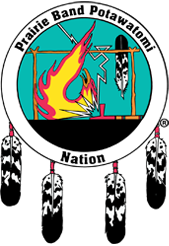January 27, 2014 –
WASHINGTON – The Department of the Interior’s Bureau of Indian Affairs is awarding more than $600,000 in grants to 18 tribes or tribal consortiums to support them in addressing the challenges of climate change as part of the President’s Climate Action Plan to reduce carbon pollution, move the economy toward clean energy sources and prepare communities for the impacts of climate change.
The Prairie Band Potawatomi Nation is one of the recipients and will seek to effectively build capacity in the area of climate change adaptation. Two members of the staff will attend climate change adaptation training and participate in regional adaptation forums. Through the proposed activities staff will acquire the skills, tools and knowledge necessary to evaluate and manage climate change adaptation issues. Prairie Band Potawatomi Nation will also communicate acquired capacity with other regional Tribes through various forum opportunities.
The grants are designed to assist tribal communities on preparedness, including through planning projects and by supporting participation in federal initiatives that assess climate change vulnerabilities and develop regional solutions.
“As part of the President’s Climate Action Plan, we are looking for ways that BIA can be a partner to tribes in preparing for the impacts of climate change,” said Assistant Secretary – Indian Affairs Kevin K. Washburn. “American Indian and Alaska Native communities can be particularly vulnerable to impacts, so it is our hope that these grants will help bolster the efforts of tribal managers to adapt to climate change.”
In choosing the FY 2013 grants announced, the BIA considered proposals for more than $5 million and gave priority to those proposals that supported multiple tribes, among other considerations. The 2013 projects include:
- The College of Menominee Nation, in cooperation with the Menominee Indian Tribe of Wisconsin, the Northeast Climate Science Center, and Pennsylvania State University, will build on a successful climate conference attended by 21 tribes presenting follow-ups on climate adaptation training in the Midwest.
- The Chugach Regional Resources Commission will coordinate regional adaption planning for six tribes in Alaska.
- The 1854 Treaty Authority will coordinate a vulnerability assessment and adaptation planning for off-reservation hunting and gathering concerns for two tribes and the authority itself in the Midwest.
- The Quinault Indian Nation, in cooperation with the Quileute Tribe and Hoh Indian Tribe, will evaluate potential impacts on culturally and economically important natural resources in the Northwest.
- The Nooksack Indian Tribe, in cooperation with the Lummi Tribe, Whatcom County, and the City of Bellingham, Wash., will perform a Nooksack River salmon vulnerability assessment leading to an adaptation plan that may benefit tribes that depend on salmon both in the Northwest and Alaska.
- The Confederated Tribes of the Umatilla Indian Reservation will develop a comprehensive tribal government climate adaptation plan spanning the range of tribal government functions. The plan will also serve as a model for other tribes addressing similar challenges, including climate impacts on infrastructure, hazard mitigation and human support systems.
- 13 tribes were awarded travel support for technical capacity-building through participation in interagency adaptation technical forums and implementation projects. The tribes include: Quinault Indian Nation, Upper Sioux Community, Walker River Paiute Tribe, Coyote Valley Band of Pomo Indians, Bear River Band of the Rohnerville Rancheria, Pueblo of Taos, Prairie Band Potawatomi Nation, Lac Vieux Desert Band of Lake Superior Chippewa Indians, Sac & Fox Tribe of the Mississippi in Iowa, Hopi Tribe, Kashia Band of Pomo Indians of the Stewarts Point Rancheria, Gila River Indian Community, and the Cherokee Nation.
